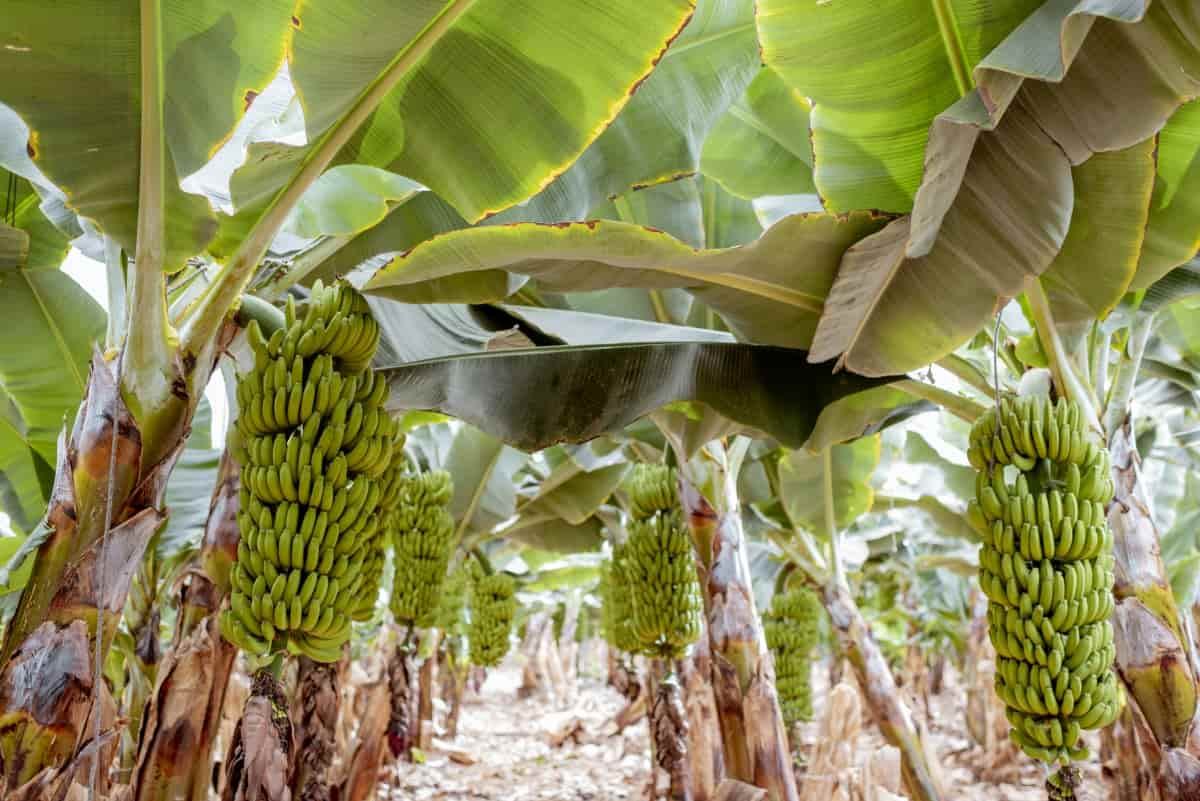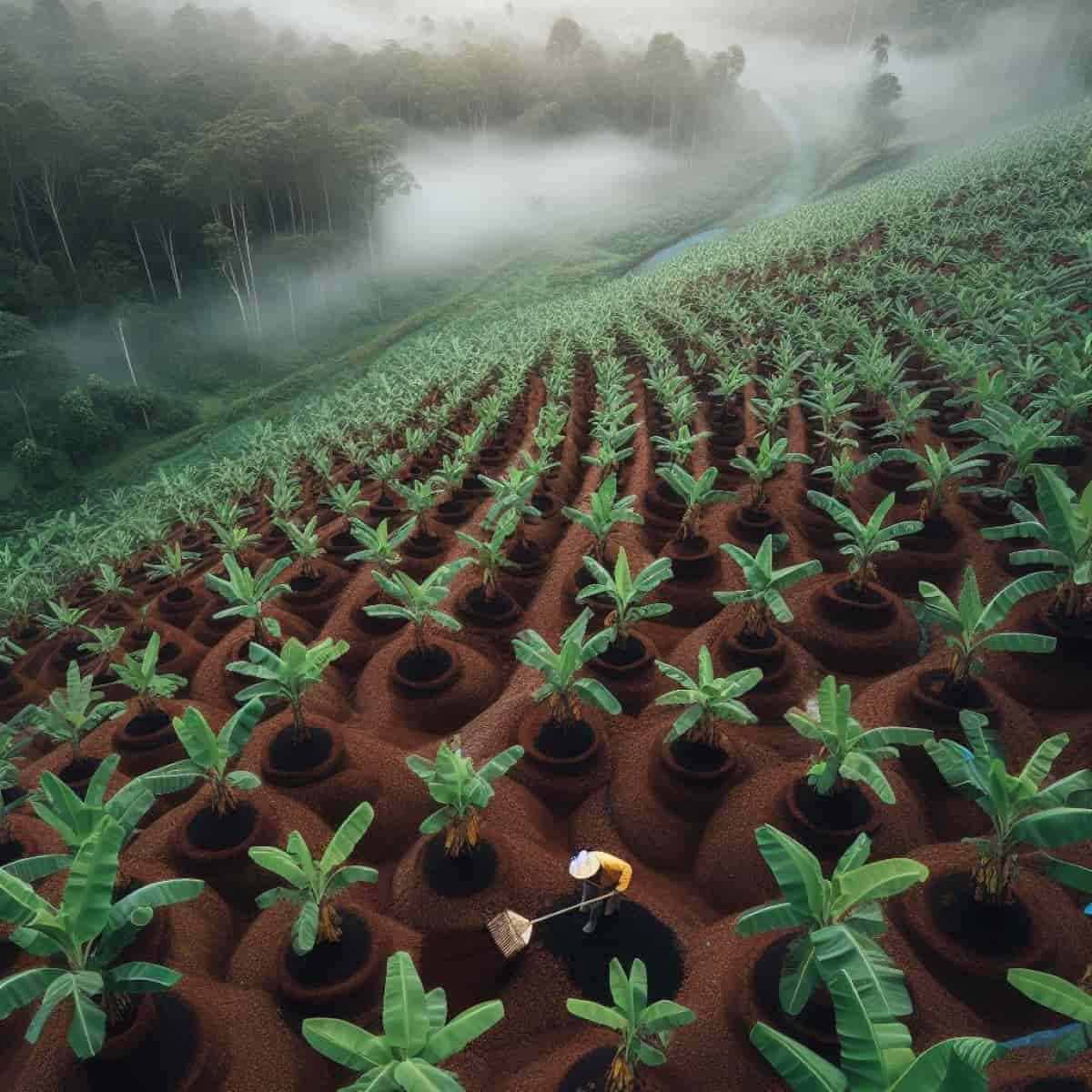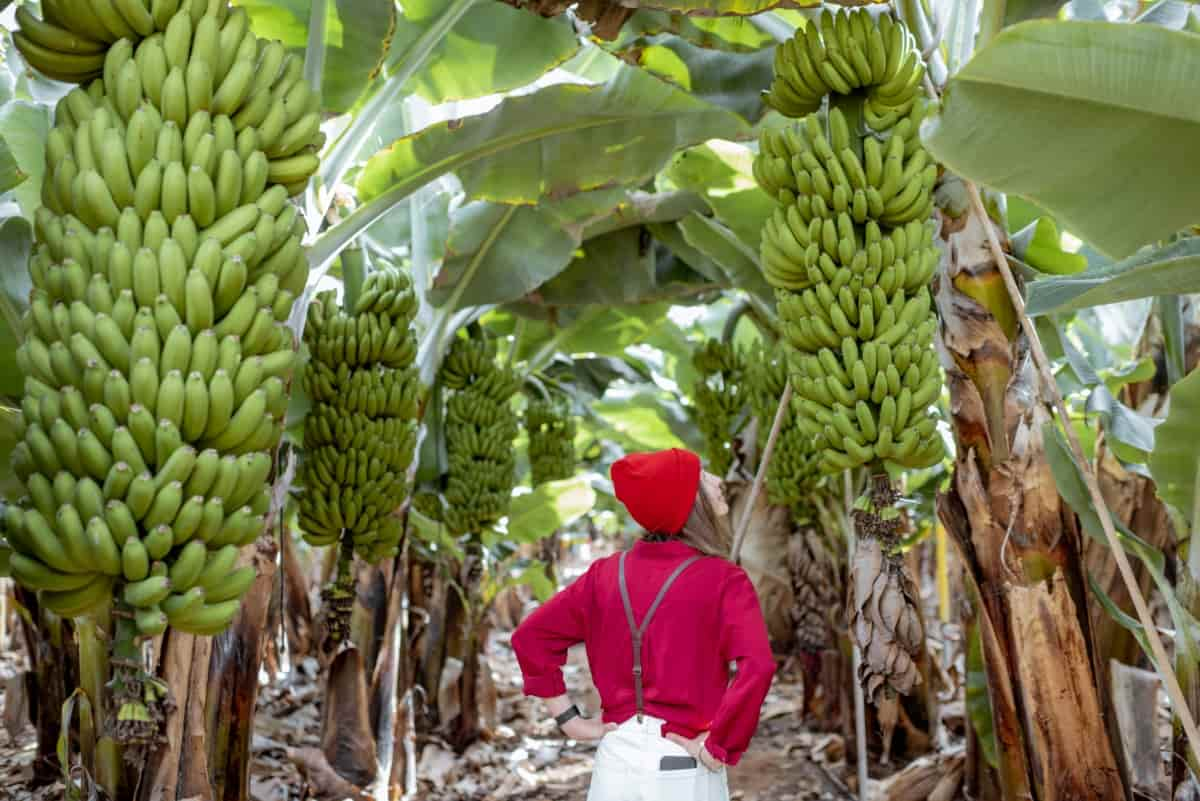Mulching is vital in banana farming for several reasons. Firstly, it helps conserve soil moisture by reducing evaporation, ensuring consistent hydration for the plants. Secondly, it moderates soil temperature, preventing extreme fluctuations that can stress the banana plants. Moreover, mulch acts as a natural weed suppressant, reducing competition for nutrients and water.

It also improves soil quality over time as it decomposes, enhancing the overall health of the banana plantation. In addition, mulch provides a protective barrier, reducing soil erosion and splashing of soil-borne diseases onto the banana plants. Ultimately, mulching contributes to higher yields and healthier banana crops.
Mulching in Banana Farming
How to Apply Mulch for Banana Plants
- Choose organic mulch: Opt for materials like straw, leaves, or compost, as they provide nutrients as they decompose.
- Prepare the soil: Ensure the soil around the banana plants is well-weeded and moist before mulching.
- Spread mulch evenly: Apply a layer of mulch about 3-4 inches thick around the base of the banana plants. Leave a gap around the plant stem to prevent rot.
- Extend the mulch area: Widen the mulch circle to cover the entire root zone, which helps conserve moisture and suppress weeds.
- Renew mulch as needed: Reapply as it decomposes to maintain its benefits throughout the growing season.
Different Types of Mulch for Banana Plantation
Organic Mulch: Enhancing Soil Fertility and Moisture Retention
Organic mulch is a valuable resource in enhancing soil fertility and moisture retention. When applied to garden beds or crop fields, organic mulch gradually breaks down, enriching the soil with essential nutrients and organic matter. This decomposition process encourages beneficial microbial activity, improving plant soil structure and nutrient availability.
Simultaneously, organic mulch forms a protective barrier that reduces water evaporation, minimizing soil moisture loss and allowing for more efficient water use. By fostering a nutrient-rich environment and conserving moisture, organic mulch plays a crucial role in promoting healthy plant growth.
Plastic Mulch: Controlling Weeds and Increasing Soil Temperature
Plastic mulch is an effective tool for weed control and soil temperature management in agriculture. When laid over the soil, it acts as a physical barrier, preventing weed growth by blocking sunlight. This minimizes competition for nutrients and water, promoting healthier crops. Plastic mulch also aids in increasing soil temperature, especially in cooler climates, by trapping heat from the sun.
In case you missed it: How to Manage Pests and Diseases in Banana Plantation: How to Control and Prevent with Different Practices

Warmer soil accelerates plant growth and development, particularly for heat-loving crops. This dual benefit of weed suppression and soil warming makes plastic mulch a valuable tool for improving crop yields, reducing labor, and conserving water resources in agriculture.
Grass Mulch: Providing Natural Weed Control and Nutrient Cycling
Grass mulch, comprised of finely shredded or chopped grass clippings, offers natural weed control and nutrient cycling in gardens and landscapes. When spread around plants, it forms a dense mat that inhibits weed growth by blocking sunlight and weed seeds from reaching the soil.
As it decomposes, grass mulch releases valuable nutrients into the ground, enriching it with organic matter, nitrogen, and other essential elements. This nutrient cycling process reduces the need for synthetic fertilizers and fosters a healthier, more fertile soil environment, supporting plants’ long-term vitality while keeping weed populations in check.
Wood Chip Mulch: Insulating Soil and Preventing Erosion
Wood chip mulch serves a dual role in soil insulation and erosion prevention. When applied as a mulch layer around plants, it works as an insulator to regulate soil temperature by keeping it cooler in hot weather and warmer in colder climates. This moderates temperature fluctuations, creating a more stable environment for plant roots.
Additionally, wood chip mulch forms a protective barrier that reduces soil erosion by slowing rainwater runoff and minimizing the impact of wind. This safeguards the topsoil, preventing its loss and preserving soil quality, making wood chip mulch a valuable addition to gardening and landscaping for plant health and environmental conservation.
Straw Mulch: Reducing Soil Erosion and Enhancing Aeration
Straw mulch is critical in reducing soil erosion and improving soil aeration. When applied as a mulch, straw creates a protective cover that shields the soil from the erosive forces of wind and rain. It prevents topsoil loss and maintains soil structure and fertility. Additionally, straw mulch gradually decomposes, adding organic matter to the soil and enhancing aeration and water infiltration.
This improved soil structure encourages healthy root development and better drainage, reducing the risk of waterlogging. Straw mulch offers a sustainable solution for preserving soil quality and reducing erosion, making it a valuable addition to agriculture and gardening.
Compost Mulch: Enriching Soil with Nutrients and Microorganisms
Compost mulch is a potent ally for soil enrichment, infusing it with a wealth of nutrients and beneficial microorganisms. As it breaks down, compost mulch releases a range of essential elements, including nitrogen, phosphorus, and potassium, improving soil fertility. Moreover, the organic matter in compost enhances soil structure, promoting water retention and aeration. The microorganisms within compost mulch bolster soil health, fostering a balanced ecosystem where beneficial bacteria and fungi help plants access nutrients and ward off pathogens.
In case you missed it: Effective Weed Control Strategies in Banana Plantation

Leaf Mulch: Improving Soil Structure and Water Infiltration
Leaf mulch is a valuable resource for enhancing soil structure and water infiltration. When applied as a mulch, fallen leaves break down gradually, infusing the soil with organic matter. This organic material improves soil texture, making it less compacted and better aerated, which allows for increased water infiltration and root penetration.
The mulch also acts as a protective cover, reducing evaporation and preventing soil erosion. This combination of improved structure and water retention makes leaf mulch an excellent choice for promoting healthier, more resilient soil in gardens and landscapes.
Sawdust Mulch: Controlling Weeds and Conserving Soil Moisture
Sawdust mulch serves as an effective means of weed control and soil moisture conservation. When spread over the soil surface, it acts as a physical barrier, blocking sunlight and inhibiting weed growth. This reduces competition for nutrients and water, benefiting the main plants. Additionally, sawdust mulch forms a protective layer that minimizes water evaporation, promoting soil moisture retention.
This dual role in weed suppression and moisture conservation makes sawdust mulch a practical choice for maintaining healthier plants, reducing the need for frequent irrigation, and minimizing weed management efforts.
Cocoa Shell Mulch: Natural Pest Control and Nutrient Source
Cocoa shell mulch offers dual benefits as a natural pest control and nutrient source. When applied around plants, it emits a chocolatey scent that deters certain pests, acting as a natural repellent. As it decomposes, cocoa shell mulch enriches the soil with organic matter, releasing valuable nutrients like nitrogen and potassium. This promotes healthier plant growth and reduces the need for synthetic fertilizers. Thus, cocoa shell mulch provides a fragrant and eco-friendly solution for managing pests and enhancing soil fertility in gardens and landscapes.
Pine Needle Mulch: Acidifying Soil and Suppressing Weeds
Pine needle mulch is a versatile option that acidifies soil and suppresses weeds. When used as mulch, pine needles gradually release acidic compounds as they decompose. Additionally, their needle-like structure creates a dense mat that hinders weed growth by blocking sunlight and inhibiting weed seeds from taking root. Pine needle mulch maintains the preferred pH levels for specific plants and provides a natural and effective weed control solution in gardens and landscapes.
In case you missed it: Watering Techniques and Irrigation Systems in Banana Plantation

Conclusion
In conclusion, mulching in banana farming is a practice that offers a range of benefits. Different types of mulch provide unique advantages, from moisture retention to weed control, soil enrichment, and temperature moderation. Selecting the right mulch for your banana plantation can increase yields, healthier plants, and more sustainable agricultural practices, making it an essential technique for successful and environmentally conscious banana cultivation.
- Feed Your Flock for Less: Top 10 Tips to Save on Chicken Feed
- Ultimate Guide to Ossabaw Island Hog: Breeding, Raising, Diet, and Care
- Hatching Answers: The Top 10 Reasons Your Chickens Aren’t Laying Eggs
- Eggs and Economics: Breaking Down the Cost of Raising Backyard Chickens
- Defend Your Greens: Proven Methods to Keep Iguanas Out of Your Garden
- Ultimate Guide to Cinnamon Queen Chicken: A Comprehensive Guide for Beginners
- Ultimate Guide to California Tan Chicken: Breeding, Raising, Diet, Egg-Production and Care
- Ultimate Guide to Marsh Daisy Chicken: Breeding, Raising, Diet, and Care
- 10 Types of Chicken Farming Businesses You Can Start for Profits
It is a very useful blog and very important information about Black Plastic Mulch.